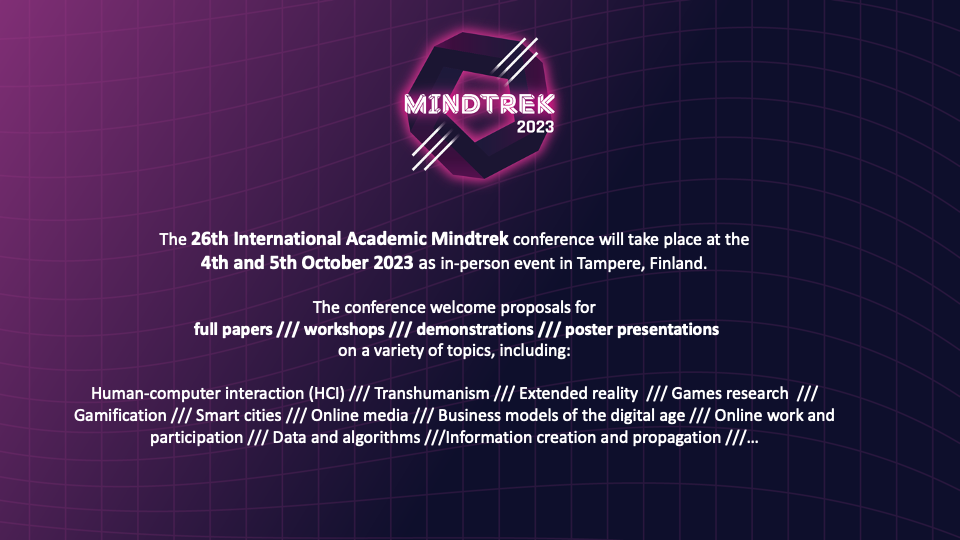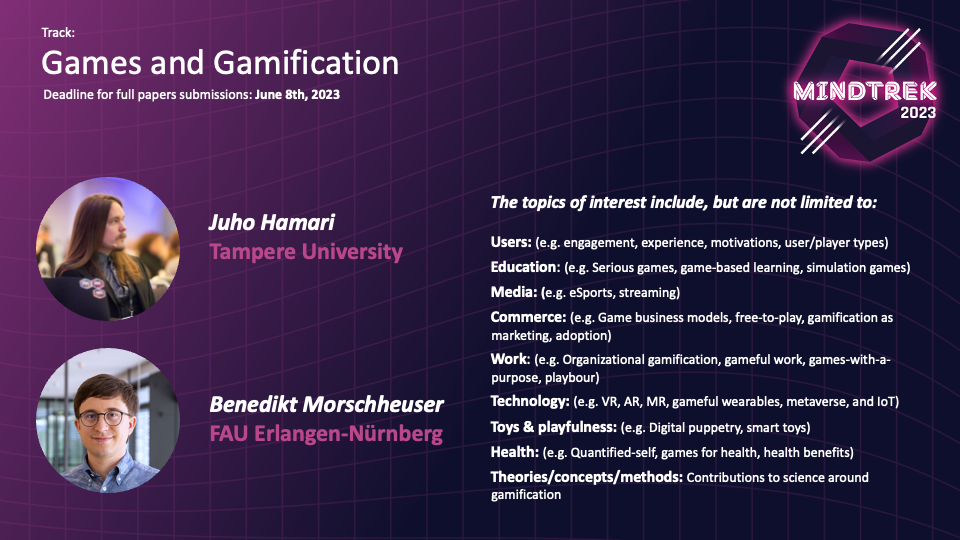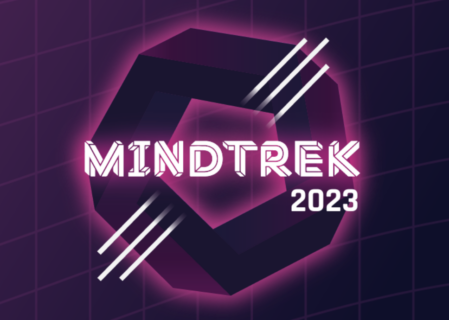Call for Papers on Games and Gamification @ 26th International Academic Mindtrek Conference
We are pleased to invite you to submit your latest games or gamification research to our call for papers at the 26th International Academic Mindtrek Conference, 4th and 5th of October 2023, Tampere, Finland. Together with Prof. Juho Hamari, Prof. Dr. Benedikt Morschheuser is co-chairing this year’s Games and Gamification Track.
Call for Papers: Games and Gamification Track at International Academic Mindtrek conference
Gamification is considered a “process of transforming any activity, system, service, product, or organizational structure into one which affords positive experiences, skills, and practices similar to those afforded by games and is often referred to as the gameful experience” (Hamari, 2019). This is commonly, but optionally, applied with an intention to facilitate changes in human behaviors or stimulate cognitive processes. As the main inspirations of gamification are games and play, gamification is realized through the application of game design (Morschheuser et al., 2018).
Gamification has become an umbrella concept that, to varying degrees, includes and encompasses other related technological developments such as serious games, game-based learning, exergames & quantified-self, games with a purpose/human-based computation games, and persuasive technology.
Secondly, gamification also manifests in a gradual, albeit unintentional, cultural, organizational and societal transformation stemming from the increased pervasive engagement with games, gameful interactions, game communities and player practices. For example, recently we have witnessed the popular emergence of augmented reality games and virtual reality technologies that enable a more seamless integration of games into our physical reality. Moreover, the media ecosystem has also experienced a degree of ludic transformation: with user-generated content becoming an important competitor for large media corporations. This transformation has led to the development of several emerging phenomena such as the Youtube and modding cultures, esports, or the ‘metaverse’, that have penetrated the cultural membrane allowing games to seep into domains hitherto dominated by traditional media.
Relevant topics include (but are not limited to):
- Users: e.g. Engagement, experience, motivations, user/player types
- Education: e.g. Serious games, game-based learning, simulation games
- Media: e.g. eSports, streaming
- Commerce: e.g. Game business models, free-to-play, gamification as marketing, adoption
- Work: e.g. Organizational gamification, gameful work, games-with-a-purpose, playbour
- Technology: e.g. VR, AR, MR, gameful wearables, metaverse and IoT
- Toys & playfulness: e.g. Digital puppetry, smart toys
- Health: e.g. Quantified-self, games for health, health benefits
- Theories/concepts/methods: Contributions to science around gamification
Hamari, J. (2019). Gamification. The Blackwell encyclopedia of sociology, 1-3.


The Academic Mindtrek conference welcome proposals for full papers, workshops, demonstrations and poster presentations on a variety of topics, as well as a Doctoral Consortium.
The International Academic Mindtrek has been for several years an exciting meeting place where researchers, experts, and thinkers present results from their latest works regarding the development of novel technology, media, and digital culture for the society of tomorrow.
Mindtrek brings together people not only from various fields and domains but also from different sectors: companies, startups, academia, and various governmental institutions.
This makes Mindtrek the perfect opportunity for advancing research results towards practical utilization by the industry, as well as getting out-of-the-box research ideas based on interaction with practitioners.
Academic Mindtrek 2023 welcomes all scientific contributions that present relevant and actual studies of today that may shape the way we interact with the technologies of tomorrow. Our goal is to facilitate meaningful experiences and knowledge sharing on how technology merges into society and what opportunities and hidden threats it brings to it.
Reviewing process and proceedings
The Academic Mindtrek conference has a rigorous peer-review process via the EasyChair system. All submissions are peer-reviewed; each paper will be reviewed by three experts in a double-blind review. The review process is managed by local track chairs and their international co-chairs and overseen by the conference chair and academic program chairs.
In cooperation with ACM and ACM SIGCHI. Contributions will be published in the ACM digital library.
Timeline for Academic Mindtrek 2023
The submission opens on the 8th of May.
Deadline for full papers and workshops submissions:
June 8th, 2023
Notification of acceptance (full papers and workshops):
August 10th, 2023
Deadline for posters, demonstration proposals and doctoral consortium submissions:
August 17th, 2023
Notification of acceptance (posters, demonstrations, and doctoral consortium):
August 26th, 2023
Camera-ready paper submission:
September 1st, 2023
Conference registration and Copyright forms submission:
September 5th, 2023
Conference dates:
October 3rd – 6th, 2023
Further details: https://www.mindtrek.org/2022/academic-2023/
